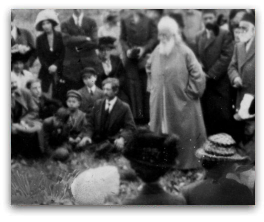arthra
Baha'i
There are relatively few Baha'i Houses of Worship in the world today and they are spaced about the world on continents mostly ... They also share certain characteristics such as nine openings or gates and usually a dome with what we the "Greatest Name". Anyone can enter a Baha'i House of Worship and pray. There are no restricted areas or altars ... and no rituals or clerical figures conducting rites. So in this thread we'll discuss some of the characteristics and history of these structures.
In the vision of Abdul-Baha there are also ancillary institutions that ideally are to surround the House of Worship:
"The Temple is the most great foundation of the world of humanity and it hath many branches. Although the Temple is the place of worship, with it is connected a hospital, pharmacy, pilgrims' house, school for the orphans, and a university for the study of high sciences. Every Temple is connected with these five things. I hope that now in America they will build a Temple and gradually add to it the hospital, school, university, pharmacy and pilgrims' house with the utmost efficiency and thoroughness. Thou shouldst make known to the believers these details, so that they may realize how important the Temple is. The Temple is not only a place for worship; nay, it is perfect in every way."
~ Abdu'l-Baha, Baha'i World Faith p. 416
The Universal House of Worship has also clarified a few issues related to programs in a Baha'i House of Worship:
Scriptures of Other Religions, Readers, Music in The House of Worship
"Your Assembly is free to use its discretion in choosing excerpts from the generally recognized scriptures of the older religions.
"With reference to your query, about the use of several readers in unison, this is permissible provided it does not seem, or become theatrical in the view of your Assembly. Concerning the placement of the readers the beloved Guardian has already indicated, 'the reader should stand where he or she will best be seen and heard by all.'
"Music in the House of Worship is to be vocal only, whether by singers or a singer. It does not matter if a guest a capella choir, or soloist is used, provided such use is not made the occasion to publicize services of Worship and the precautions you mention are taken. No doubt the excellent recordings available today would assure the highest quality of performance at low cost, but all references to vocal music in the central Edifice imply the physical presence of the singers."
(From a letter of the Universal House of Justice to the National Spiritual Assembly of the United States, March 13, 1964)
(Compilations, Lights of Guidance, p. 608)
In the vision of Abdul-Baha there are also ancillary institutions that ideally are to surround the House of Worship:
"The Temple is the most great foundation of the world of humanity and it hath many branches. Although the Temple is the place of worship, with it is connected a hospital, pharmacy, pilgrims' house, school for the orphans, and a university for the study of high sciences. Every Temple is connected with these five things. I hope that now in America they will build a Temple and gradually add to it the hospital, school, university, pharmacy and pilgrims' house with the utmost efficiency and thoroughness. Thou shouldst make known to the believers these details, so that they may realize how important the Temple is. The Temple is not only a place for worship; nay, it is perfect in every way."
~ Abdu'l-Baha, Baha'i World Faith p. 416
The Universal House of Worship has also clarified a few issues related to programs in a Baha'i House of Worship:
Scriptures of Other Religions, Readers, Music in The House of Worship
"Your Assembly is free to use its discretion in choosing excerpts from the generally recognized scriptures of the older religions.
"With reference to your query, about the use of several readers in unison, this is permissible provided it does not seem, or become theatrical in the view of your Assembly. Concerning the placement of the readers the beloved Guardian has already indicated, 'the reader should stand where he or she will best be seen and heard by all.'
"Music in the House of Worship is to be vocal only, whether by singers or a singer. It does not matter if a guest a capella choir, or soloist is used, provided such use is not made the occasion to publicize services of Worship and the precautions you mention are taken. No doubt the excellent recordings available today would assure the highest quality of performance at low cost, but all references to vocal music in the central Edifice imply the physical presence of the singers."
(From a letter of the Universal House of Justice to the National Spiritual Assembly of the United States, March 13, 1964)
(Compilations, Lights of Guidance, p. 608)




